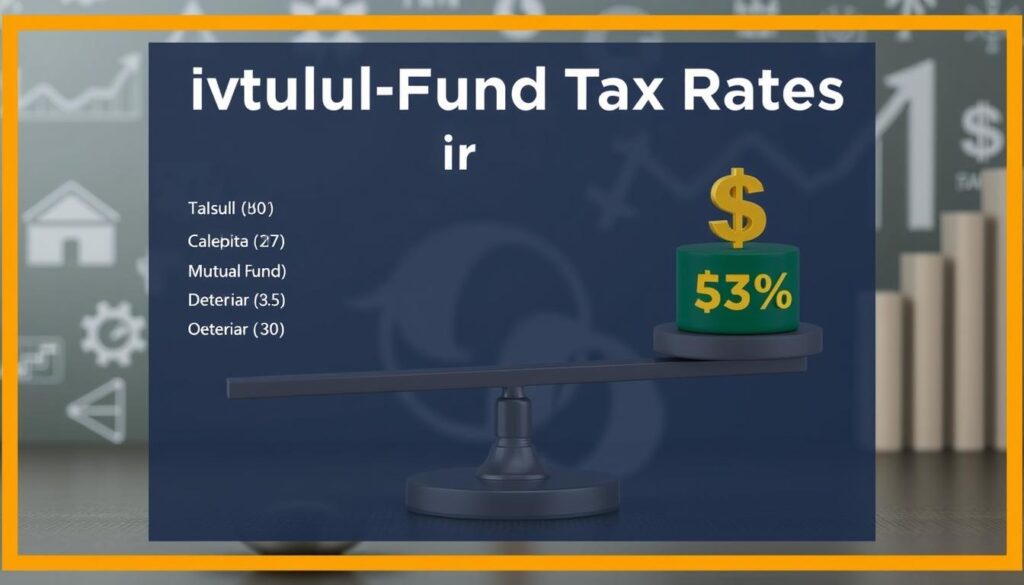What is the withholding tax on mutual funds in Pakistan? Investing in Pakistan means knowing about taxes on your mutual funds. Withholding tax is a key part of Pakistan’s tax system. It affects how much you make from your mutual fund investments. We’ll look into withholding tax on mutual funds, including rules, tax rates, and how it affects both individuals and companies.

Key Takeaways
- Withholding tax is a critical component of the mutual fund taxation system in Pakistan.
- The Securities and Exchange Commission of Pakistan (SECP) plays a pivotal role in regulating mutual fund taxation.
- Understanding the different types of mutual funds and their respective tax implications is essential for informed investment decisions.
- Holding period and profit distribution can significantly impact the tax obligations for mutual fund investors.
- Recent tax reforms in Pakistan have introduced changes that affect the mutual fund investment landscape.
Understanding Mutual Fund Taxation in Pakistan
Understanding mutual fund taxation in Pakistan is complex. It involves knowing the tax framework, regulatory oversight, and key stakeholders. This section will give you a detailed overview to help you make smart investment choices.
Basic Tax Framework for Investment Vehicles
Pakistan’s tax system for investments, like mutual funds, aims for transparency and fairness. It has rules, deductions, and exemptions for different investment products. Knowing these details is key to a good investment strategy and lower taxes.
Role of SECP in Mutual Fund Regulation
The Securities and Exchange Commission of Pakistan (SECP) is crucial in regulating mutual funds. It sets guidelines, enforces rules, and ensures the mutual fund industry works well. Understanding the SECP’s role helps you make better investment choices.
Key Stakeholders in Mutual Fund Taxation
- Mutual Fund Managers: They manage investments and use tax-efficient strategies for investors.
- Investors: They are the main users of mutual fund services and have different tax obligations.
- Tax Authorities: The government’s tax bodies, like the Federal Board of Revenue (FBR), make and enforce tax rules for mutual funds.
- Financial Advisors: They offer advice on the tax aspects of mutual fund investments.
Knowing the roles of these stakeholders helps you make informed decisions and follow tax rules.
What is the withholding tax on mutual funds in Pakistan?
In Pakistan, withholding tax is key in taxing mutual fund investments. It’s a system where a part of the income from mutual funds is taken out before it reaches the investor. This is called tax deduction at source and helps follow the country’s tax rules.
The withholding tax definition in Pakistan mutual fund tax means a certain percentage of what an investor earns is kept by the fund or financial company. This money is then given to the government, acting as a payment of the investor’s taxes.
The goal of withholding tax on mutual funds in Pakistan is to make tax collection easier and stop tax evasion. By taking a part of the earnings before it reaches the investor, the government makes sure taxes are paid correctly.
| Mutual Fund Category | Withholding Tax Rate |
|---|---|
| Equity Funds | 10% |
| Income Funds | 10% |
| Money Market Funds | 10% |
The table shows the current withholding tax rates for different mutual fund types in Pakistan. These rates can change with new tax policies, so investors need to keep up with updates.

“The withholding tax on mutual funds in Pakistan is a crucial mechanism for ensuring the proper collection of taxes and promoting compliance within the investment landscape.”
Types of Mutual Funds Subject to Withholding Tax
In Pakistan, it’s key to know about mutual fund taxes. We’ll look at equity, income, and money market funds. Each has its own tax rules.
Equity Funds and Their Tax Implications
Equity funds mainly invest in stocks. They face a withholding tax on what they give back to investors. The tax rate depends on if you’re an individual or a company.
Equity fund taxes in Pakistan aim to encourage long-term investing. They offer lower rates for those who hold on longer.
Income Funds and Tax Considerations
Income funds aim for regular income from bonds and other fixed-income securities. They also face a withholding tax. But, the tax rate might be different from equity funds.
It’s important to understand income fund taxes. This helps investors make their portfolios more tax-efficient.
Money Market Funds Tax Structure
Money market funds invest in short-term, liquid assets. They have a lower withholding tax rate. This is because they are considered lower-risk and have shorter investment times.
Knowing the tax rules for money market funds helps investors make better choices. This ensures they get the most from their investments.
Learning about the taxes on different mutual funds in Pakistan helps you invest smarter. You can make your portfolio work harder for you. Next, we’ll explore the current withholding tax rates for each fund type.

Current Withholding Tax Rates for Different Fund Categories
Investing in mutual funds in Pakistan means knowing about withholding tax rates. The tax rates change based on the type of mutual fund. We’ll explore the current withholding tax percentages for various mutual fund categories. This will help you understand the tax landscape better.
Equity Funds
Equity funds mainly invest in stocks. They have a 10% withholding tax rate for individual investors. But, corporate investors face a 15% rate.
Income Funds
Income funds aim to provide regular income through fixed-income securities. They have a 10% withholding tax rate for both individual and corporate investors.
Money Market Funds
Money market funds invest in short-term, liquid instruments. They have a 10% withholding tax rate for both individual and corporate investors.
| Fund Category | Withholding Tax Rate for Individuals | Withholding Tax Rate for Corporates |
|---|---|---|
| Equity Funds | 10% | 15% |
| Income Funds | 10% | 10% |
| Money Market Funds | 10% | 10% |
Remember, these tax rates can change. Always check with a tax expert or the latest rules. This ensures you know the current Pakistan mutual fund tax rates, withholding tax percentages, and fund category taxation.

“Understanding the tax implications of your mutual fund investments is crucial in Pakistan. Stay informed and make the most of your investment returns.”
Tax Implications for Individual vs Corporate Investors
In Pakistan, individual and corporate investors face different tax rules for mutual funds. Knowing these differences helps you follow the law and save on taxes.
Individual Investor Tax Obligations
As an individual, you must pay taxes on your mutual fund earnings. You’ll face a withholding tax on dividends or capital gains. The tax rate can be between 10% and 15%, based on the fund type and how long you hold it.
You also need to report your mutual fund income on your tax return each year. This makes sure your earnings are taxed correctly.
Corporate Entity Tax Requirements
Corporate investors, like companies or trusts, have different tax rules. Corporate investors pay higher withholding taxes and must follow specific reporting rules.
The corporate tax rate on mutual fund earnings can reach 29%. The filing process is more complex, needing detailed documents and strict compliance.
Tax Filing Requirements
Both individual and corporate investors must fulfill tax filing requirements to avoid fines. This means submitting the right forms, providing necessary documents, and paying taxes on time.
Understanding mutual fund taxes in Pakistan helps investors make smart choices. This way, they can improve their tax situation and investment strategy.

| Investor Type | Withholding Tax Rate | Tax Filing Requirements |
|---|---|---|
| Individual Investor | 10-15% | Report mutual fund income on annual tax return |
| Corporate Investor | Up to 29% | Detailed documentation and compliance measures |
Exemptions and Tax Credits Available
Investing in mutual funds in Pakistan can offer tax exemptions and credits. These can help increase your returns. It’s important to know about these benefits to optimize your portfolio and lower your taxes.
Some mutual funds in Pakistan are tax-exempt. For example, equity funds might not have capital gains tax. This can help your investments grow more. The government also gives mutual fund tax credits for certain funds, like those in infrastructure or tech.
- Equity funds may be exempt from capital gains tax, providing tax-efficient growth opportunities.
- Mutual fund tax credits are available for investments in targeted sectors like infrastructure or technology.
- Investment tax relief schemes can further enhance the attractiveness of mutual fund investments in Pakistan.
It’s key to work with a financial advisor or tax expert to use these tax benefits. They can help you find the best Pakistan tax exemptions, mutual fund tax credits, and investment tax relief for your goals and risk level.
“Maximizing your mutual fund investments through strategic tax planning can have a significant impact on your long-term wealth accumulation.”
Using tax exemptions and credits can increase your returns and help reach your financial goals. Stay updated and work with experts to make the most of Pakistan’s mutual fund tax incentives.
Impact of Holding Period on Taxation
In Pakistan, the time you hold a mutual fund can change how much tax you pay. Knowing the difference between short-term and long-term investment taxes is key to saving on taxes.
Short-term vs Long-term Investment Taxation
Investments held for under a year are short-term. Any gains you make will be taxed as regular income. This can be up to 29% for both individuals and companies.
But, if you hold your investment over a year, it’s long-term. Then, any gains are taxed at a lower Pakistan capital gains tax rate.
Strategic Hold Periods for Tax Efficiency
- For short-term investments, keep your mutual fund for less than a year. This way, you pay less in capital gains tax.
- For long-term investments, aim for more than a year. This helps you avoid higher taxes and keeps more of your earnings.
- Plan your short-term vs long-term investment tax strategies well. This helps you get the most from your investments while keeping taxes low.
Knowing how your holding period affects taxes lets you make better choices. This way, you can grow your mutual fund investments in Pakistan more efficiently, keeping more of your earnings.
Distribution of Profits and Tax Deduction Process
Investing in mutual funds in Pakistan means knowing about profit distribution and tax deductions. This guide will help you understand how your investments are taxed. It’s key to making smart financial choices.
Profit Distribution in Mutual Funds
Mutual funds in Pakistan share profits with investors regularly. This can be dividends or capital gains, based on the fund’s investments and performance.
Tax Deduction Process
The tax deduction process for mutual fund distributions is important. Here’s what you need to know:
- Mutual fund companies figure out the mutual fund profit distribution based on the fund’s performance and income.
- The Pakistan dividend taxation is applied to these distributions. The tax rates depend on the fund type and the investor’s status.
- The tax deduction procedure is followed. The mutual fund company takes out the taxes before giving the net amount to the investor.
The tax deduction procedure can change based on your tax duties and the mutual fund type. Knowing this helps with tax planning and better returns.
“The tax deduction process is a critical aspect of mutual fund investing in Pakistan, as it ensures that investors fulfill their tax obligations while also maximizing the potential returns from their investments.”
Understanding profit distribution and tax deductions helps you make better investment choices. It’s essential for planning your financial future.
Recent Changes in Mutual Fund Tax Regulations
The Pakistani investment scene has seen big changes in mutual fund taxes lately. The 2023 tax reforms have brought in new rules that will affect both personal and business investors.
2023 Tax Reforms and Their Impact
The 2023 tax reforms in Pakistan have made several important changes to mutual fund taxes. These updates aim to boost long-term investments and help the financial sector grow.
- Lowered withholding tax rates for equity and income funds to encourage long-term investments.
- Introduced tax credits for investments kept for over a year, rewarding those who wait.
- Made tax filing easier for investors, simplifying the process.
Future Tax Policy Outlook
The Pakistani government is still working on its investment tax policies. Investors can look forward to more changes in the future. The goal is to make the investment environment more welcoming and grow the mutual fund industry.
| Key Anticipated Changes | Potential Impact |
|---|---|
| More tax breaks for long-term investments | Encourage longer-term asset plans |
| Special tax perks for retirement and education funds | Boost long-term financial planning and savings |
| Aligning mutual fund tax rules with global standards | Make Pakistan’s investment scene more competitive |
As the Pakistani government keeps improving its investment tax policy changes, investors will see a more investor-friendly place. And the growing mutual fund industry will also benefit.
Common Tax Calculation Methods for Fund Returns
As an investor in Pakistan, it’s important to know how taxes are calculated on your mutual fund returns. This knowledge helps you make better investment choices and manage taxes more effectively.
The mutual fund tax calculation in Pakistan mainly uses two methods. The first is based on the Pakistan investment return taxation of the fund’s net asset value (NAV). The second method, fund performance tax assessment, looks at the overall performance of the fund.
The NAV-based method calculates taxes by applying a withholding tax rate to the difference in NAVs. This method gives a clear view of the taxes you’ll pay on your investment returns.
FAQ
What is the withholding tax on mutual funds in Pakistan?
In Pakistan, the withholding tax on mutual funds is a tax taken out by the fund company. It’s for the income and gains from these investments.
How is the basic tax framework for investment vehicles in Pakistan structured?
Pakistan has a tax framework for investments. The government and the Securities and Exchange Commission of Pakistan (SECP) set the rules. The SECP oversees the mutual fund industry and its taxes.
Who are the key stakeholders involved in mutual fund taxation in Pakistan?
Key players in mutual fund taxes in Pakistan include the government, the SECP, and fund companies. Also, individual and corporate investors play a role.
What is the purpose of withholding tax on mutual funds in Pakistan?
Withholding tax on mutual funds in Pakistan helps the government collect taxes. It’s taken out at the source, ensuring the government gets its share of taxes.
Read More
